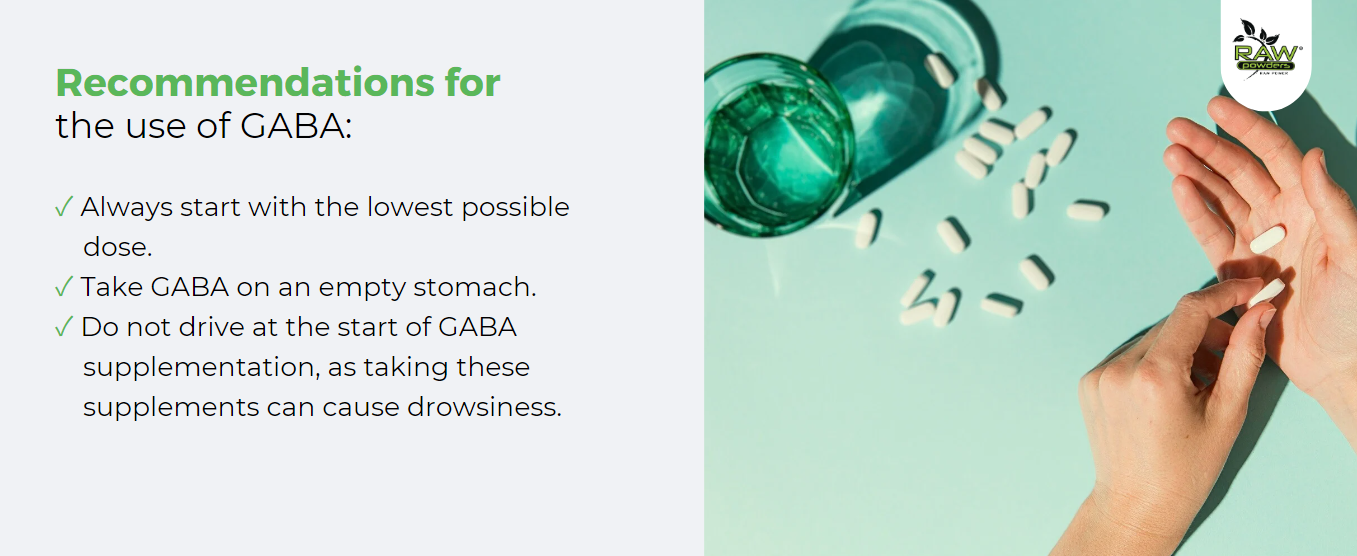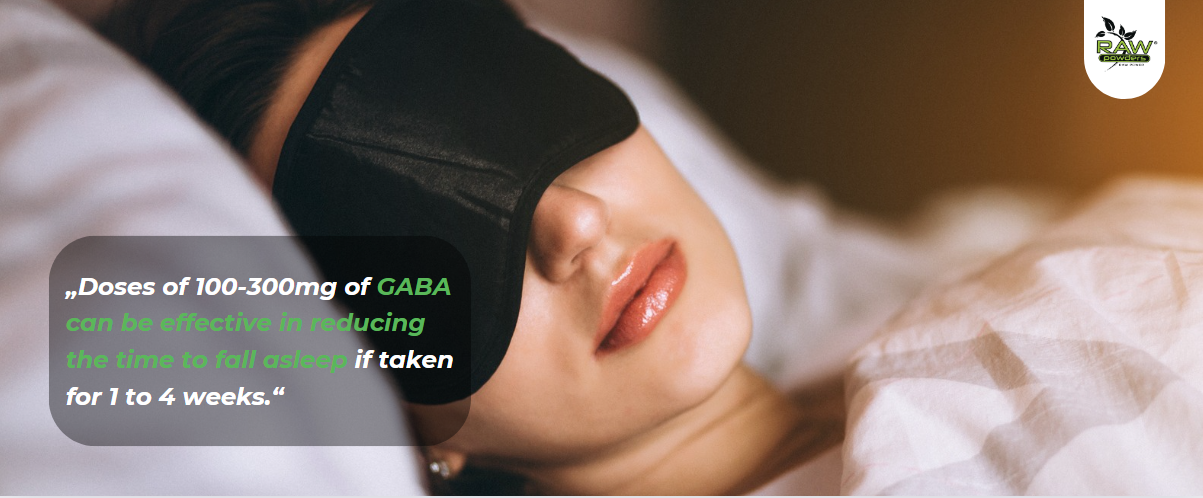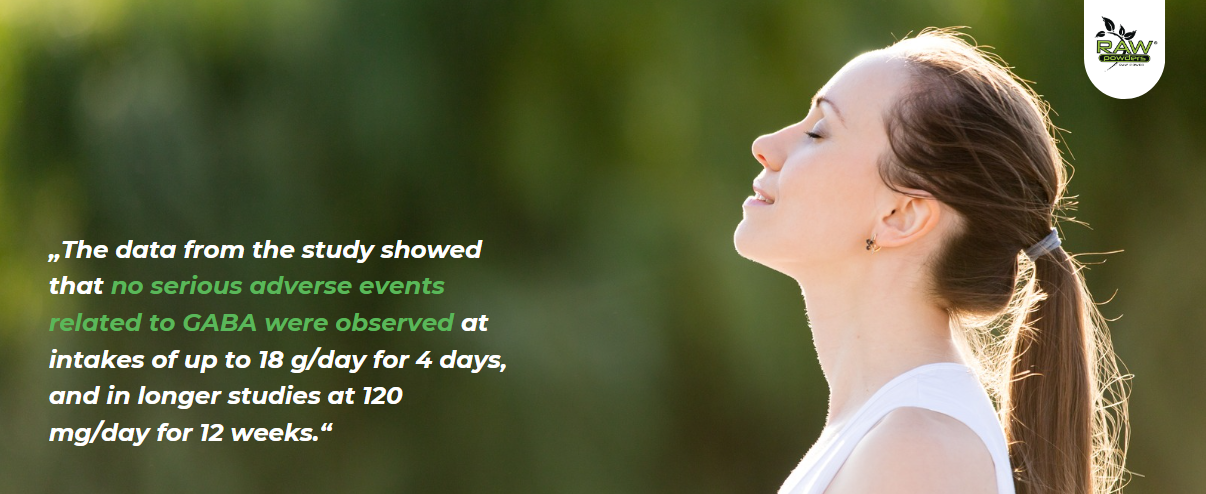GABA DOSAGE GUIDE

Starting to use GABA, it is important to begin with the smallest dose, for example, 500 mg capsules, and pay attention to the individual body's reaction. It is also necessary to avoid driving or engaging in other activities that require concentration due to the potential drowsiness effect. It is recommended to consult with a healthcare professional, especially if you are taking other medications.
A healthy lifestyle is very important, but everyday life often gets in the way and good intentions go unfulfilled. This is why Americans are increasingly turning to food supplements such as GABA (gamma-aminobutyric acid), known for its calming, relaxing, anxiety-reducing and is said to improve sleep [1].
In this blog post, we'll give you some information on what to look out for when taking GABA supplements and what is the recommended dosage for these supplements.

Recommendations for the use of GABA
Always start with the lowest possible dose to assess individual response. Remember that GABA should be taken on an empty stomach.
The simplest way, especially when traveling, is to take GABA capsules. The capsules usually contain 500 mg of GABA, which is why they are particularly recommended for first-time users (the dose of GABA in capsules and tablets is always constant).
GABA powder can be dosed up to 1 000 mg per serving or as needed. However, this is recommended for experienced users.
Since GABA can make some people sleepy, you shouldn’t drive or operate machinery after taking GABA until you know how it affects you.
Labels of GABA-containing products found in the DSLD ((the Dietary Supplement Label Database), which provides information about the ingredients of dietary supplements available in the United States.) recommend intake amounts of up to 3 g per day (range of 45 mg to 3000 mg per day), although a majority of products (>70% of the 38 sampled) recommended 600–750 mg/day in divided doses [2].
Problems that can be caused by shortage of GABA
Shortage (deficiency) of functional GABA transaminase enzyme that causes serious symptoms is very rare and it is a medical condition that can't be treated by Food Supplements.
When the levels of neurotransmitters, including GABA, in your brain are balanced, you feel motivated, productive and energetic. And you feel calm and relaxed during leisure time. When GABA levels are low, you feel fearful, constantly anxious, your thoughts seem to "escape", you are often late and disorganized. Many people who experience such a drop in GABA turn to carbohydrate-rich foods and drugs or alcohol to relax. However, it's important to emphasize that while these substances may provide temporary relief, they can also exacerbate underlying issues and lead to dependency or other health problems in the long term.
Taking GABA can reduce stress
Stress markers of both divisions of the autonomic nervous system (ANS) and the central nervous system (CNS) appear to be affected by oral GABA intake. However, it's important to note that the efficacious doses for stress reduction and/or stress-protective benefits range from 2.01 to 100 mg. Lower doses up to 30 mg seem to affect the autonomic markers of stress, while a dose of 100 mg seems to affect the central markers of stress [3].
For example, sixty-three adults (28 males, 35 females) participated in a randomized, single blind, placebo-controlled, crossover design study over two experiment days. Capsules containing 100 mg of GABA or dextrin as a placebo were used as test samples. The results showed that electroencephalography (EEG) activities including alpha band and beta band brain waves decreased depending on the mental stress task loads, and the condition of 30 min after GABA intake diminished this decrease compared with the placebo condition. That is to say, GABA might have alleviated the stress induced by the mental tasks. This effect also corresponded with the results of the POMS (profile of mood states) scores [4].

Gaba dosage for sleep
A recent Systematic Review (2020) concludes that repeated intake of GABA across days may improve early sleep parameters. However, it's important to note that doses required to elicit sleep benefits, ranging between 100 and 300 mg for biosynthetic GABA, appear to be higher than those needed for stress benefits, ranging between 20 and 100 mg for biosynthetic GABA and 2.01 and 26.4 mg for natural GABA. Furthermore, these sleep benefits seem to require long-term use (1–8 weeks) and primarily impact early sleep measures [5].
Having said that, doses ranging between 100 and 300 mg seem to be efficacious in reducing sleep latency with prolonged use of 1–4 weeks. Again, it is important to note that all sleep studies which reported improved objective sleep measures utilized biosynthetic forms of GABA. Future research is required to understand:
1) the minimum and optimum natural and biosynthetic GABA doses required to affect different stages of sleep;
2) whether lower doses might be more efficacious for peripheral markers of sleep.
In a prospective, randomized, double-blind, and placebo-controlled trial, 40 patients complaining of insomnia symptoms were enrolled and randomly assigned to either the GABA treatment group (n=30) or the placebo group (n=10). The study demonstrated that treatment with unpolished-rice-germ-derived GABA not only improved subjective sleep quality but also enhanced objective sleep efficacy without causing severe adverse events [5].
Is it dangerous to overdose on GABA?
The NNHPD (Natural and Non-prescription Health Products Directorate, Canada) monograph for Cognitive Function Products recommends a daily intake of 50–3000 mg GABA that does not exceed 750 mg per single dose; it also says to consult a healthcare practitioner for use of products providing 300 mg/day or more when GABA is used for longer than 4 weeks [6].
An overdose of GABA can also lead to the opposite of the intended effects, i.e. sleep disturbances or anxiety attacks. An overdose of GABA may cause red skin, tingling or slight numbness in the hands and feet. If in doubt, consult your doctor.
In particular, those who are already taking prescription medicines or psychotropic drugs should consult their doctors in advance. An overdose of GABA-containing drugs can have adverse effects on brain neurochemistry.
Clinical studies investigated the effect of pure GABA as a dietary supplement or as a natural constituent of fermented milk or soy matrices. Data showed no serious adverse events associated with GABA at intakes up to 18 g/d for 4 days and in longer studies at intakes of 120 mg/d for 12 weeks. Some studies showed that GABA was associated with a transient and moderate drop in blood pressure (<10% change). No studies were available on effects of GABA during pregnancy and lactation, and no case reports or spontaneous adverse events associated with GABA were found. Chronic administration of GABA to rats and dogs at doses up to 1 g/kg/day showed no signs of toxicity. Because some studies showed that GABA was associated with decreases in blood pressure, it is conceivable that concurrent use of GABA with anti-hypertensive medications could increase risk of hypotension. Caution is advised for pregnant and lactating women since GABA can affect neurotransmitters and the endocrine system, i.e., increases in growth hormone and prolactin levels.
At much higher doses of 5 g/day and 10 g/day, the only mild side effect noted was a slight burning sensation in the throat, which disappeared after a few minutes. In some cases, the burning sensation was accompanied by brief shortness of breath [2].
For more information on the possible side effects of taking GABA, see our blog GABA side effects.
Key points and noteworthy facts
- GABA is a naturally occurring neurotransmitter in the body, but can be replenished through dietary supplements. For more information on what gaba is, see here.
- It is important to consult professionals if you have more serious problems such as depression or long-term anxiety. Read more about the benefits of gaba for the human body here.
- GABA may be useful in regulating sleep quality and short-term anxiety.
It is important to follow the recommendations and pay attention to your body's response when taking it. Always consult your doctor or specialist before taking GABA or other supplements.
Medical Disclaimer
The information provided in our articles is solely for educational purposes and should not be considered medical advice or instruction. No action or inaction should be taken based solely on the contents of this information. Readers should consult their health care professional on any matter related to their health and well-being. The information and opinions provided here are believed to be accurate and sound, based on the best judgment available to the authors, but readers who fail to consult with appropriate health authorities assume the risk of any injuries. The publisher is not responsible for errors or omissions.
Please be aware that different countries may have specific regulations and that this disclaimer does not replace the need for consultation with a healthcare provider before beginning or changing a treatment or supplement regimen. The information contained in this article is not intended to diagnose, treat, cure, or prevent any disease. Individual results may vary.
References
- Jewett, B. E., & Sharma, S. (2023). Physiologie, GABA. In der National Library of Medicine. Abgerufen von https://www.ncbi.nlm.nih.gov/books/NBK513311/
- Hellen A. Oketch-Rabah, Emily F. Madden, Amy L. Roe, Joseph M. Betz. United States Pharmacopeia (USP) Sicherheitsüberprüfung von Gamma-Aminobuttersäure (GABA). Nutrients 2021, 13(8), 2742; https://doi.org/10.3390/nu13082742. Veröffentlicht: 10. August 2021. https://www.mdpi.com/2072-6643/13/8/2742
- Piril Hepsomali, John A. Groeger, Jun Nishihira, Andrew Scholey. Auswirkungen der oralen Verabreichung von Gamma-Aminobuttersäure (GABA) auf Stress und Schlaf beim Menschen: Eine systematische Überprüfung. Front Neurosci. 2020 Sep 17:14:923. doi: 10.3389/fnins.2020.00923. eCollection 2020. PMID: 33041752 PMCID: PMC7527439. https://pubmed.ncbi.nlm.nih.gov/33041752/
- A Yoto, S Murao, M Motoki, Y Yokoyama, N Horie, K Takeshima, K Masuda, M Kim, H Yokogoshi. Die orale Einnahme von γ-Aminobuttersäure wirkt sich auf die Stimmung und die Aktivitäten des zentralen Nervensystems unter Stressbedingungen aus, die durch mentale Aufgaben ausgelöst werden. Randomized Controlled Trial Amino Acids. 2012 Sep;43(3):1331-7. doi: 10.1007/s00726-011-1206-6. Epub 2011 Dec 28. PMID: 22203366. https://pubmed.ncbi.nlm.nih.gov/22203366/
- Jung Ick Byun, Yu Yong Shin, Sung Eun Chung, Won Chul Shin. Sicherheit und Wirksamkeit von Gamma-Aminobuttersäure aus fermentierten Reiskörnern bei Patienten mit Schlaflosigkeitssymptomen: Eine randomisierte, doppelblinde Studie. J
- Clin Neurol. 2018 Jul;14(3):291-295. doi: 10.3988/jcn.2018.14.3.291. Epub 2018 Apr 27. PMID: 29856155 PMCID: PMC6031986. https://pubmed.ncbi.nlm.nih.gov/29856155/
- Government of Canada. Cognitive Function Products. March 12, 2021. https://webprod.hc-sc.gc.ca/nhpid-bdipsn/atReq.do?atid=fonc.cognitive.func&lang=eng





_front%20(1)-250x250.png)



_front%20(1)-250x250.png)

-(NN)_front%20(1)-min-250x250.png)

_front%20(1)-250x250.png)


_front%20(1)-min-250x250.png)
_front%20(1)%20(1)-250x250.png)
_front%20(1)%20(1)-250x250.png)
_front%20(1)-min-250x250.png)
_front%20(1)-min-250x250.png)
_front%20(1)%20(1)-250x250.png)
_front%20(1)%20(1)-250x250.png)



-250x250.png)
_front-250x250.png)

